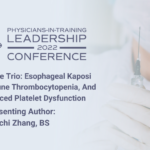Abstract | April 5, 2022
An Unfortunate Trio: Esophageal Kaposi Sarcoma, Immune Thrombocytopenia, And Uremia-Induced Platelet Dysfunction
Learning Objectives
- Recognize the potential complications arising from gastrointestinal Kaposi Sarcoma and other HIVassociated conditions.
HIV can cause a wide range of systemic sequelae and complicate patients’ hospital course in unexpected ways. Here, we present a case of newly diagnosed HIV leading to various infectious and autoimmune conditions that all contributed to dangerous gastrointestinal hemorrhage.
A 46-year-old male with no known medical history presents with worsening chronic cough of one-year duration. He also reports shortness-of-breath and increasing fatigue. On presentation, he is noted to have numerous umbilicated facial lesions that are actively bleeding. Subsequent HIV testing was positive and CD4 count was 0.1. Chest CT revealed a right perihilar consolidation with concern for pneumonia, various opportunistic infections, and malignancy. He was initially started on azithromycin and ceftriaxone. Amphotericin was added to the regimen after cryptococcal antigen was found in the serum and cerebral spinal fluid. Subsequent bronchial biopsy and facial skin lesion biopsy also revealed cryptococcus. The patient reported improvement of cough in following days but persistent fatigue.
While on amphotericin, the patient developed acute kidney injury with creatinine up to 9.7 and muddy brown casts seen on urinalysis. All medications were dosed renally and peri-amphotericin hydration was given. On hospital day ten, the patient was found to have melena and hemoglobin levels had dropped to 6.3 from a baseline of 10.2. Platelets also dropped to 95 from a baseline of 297, consistent with HIVinduced immune thrombocytopenia. After one unit of pRBC transfusion, a colonoscopy revealed no features of malignancy, but esophagogastroduodenoscopy showed highly vascularized esophageal mucosa consistent with Kaposi Sarcoma. The patient’s anemia required two more transfusions during the hospital course but eventually stabilized. He was discharged after finishing amphotericin induction and instructed to follow up for acute retroviral therapy and chemotherapy.
While Kaposi Sarcoma of the skin and oral mucosa is common in HIV patients, gastrointestinal manifestations are rarer and more insidious. Bleeding from this friable esophageal mucosa was further complicated by HIV-induced immune thrombocytopenia. Finally, cryptococcal infections require extended treatment with amphotericin, which can often cause renal damage, uremia, and subsequent platelet dysfunction. The interplay of the various sequelae of HIV can often perplex the management of comorbid medical conditions.

